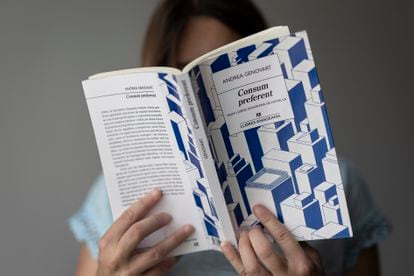Practically 20 years in the past, the Spanish essayist and philosophy professor José Antonio Marina, 84, printed Anatomía del miedo: un tratado sobre la valentía [Anatomy of Fear: A treatise on courage], the place he broke down all the family tree of “the good household of anguish, unease, terror and vulnerability.” And, simply two months in the past, Andrea Genovart – a 30-year-old novelist from Spain’s northeastern area of Catalonia – received a prestigious literary prize, Premio Anagrama, along with her novel Consum Preferent, written in a zany mixture of Spanish-Catalan-French-English-and extra. Apart from its affect when it comes to literary model, the e-book is a bitter and satirical portrait of her technology: the one caught between the financial disaster of 2008 and the Covid pandemic of 2020.
EL PAÍS invited each writers to the Ateneo de Madrid – a personal cultural establishment positioned within the capital of Spain – to debate fears, bravery, doubts, conformism, skepticism, cowardice and anger.
Query. We appear to be surrounded by worry, whether or not or not it’s worry of local weather change, worry of dropping our job, worry of not becoming in, worry of synthetic intelligence, worry of polarization, worry of one other pandemic, worry of warfare, worry of our family members being in peril, worry of God… or simply plain outdated worry, inexplicable worry. Has this at all times been the case? Or is it extra prevalent in the present day?
José Antonio Marina. One of the vital lasting emotions in humanity is worry. It’s been an excellent social organizer: energy has at all times been devoted to worry. [Power often] prevails due to worry. Machiavelli assumed that individuals could possibly be commanded both by means of love or by means of worry. It will be higher [if we were more susceptible] to like, however worry is simpler.
Andrea, I wished to ask you one thing: I don’t know if the brand new generations — who, logically. ought to really feel very afraid of future uncertainty — have someway tailored to worry, as a result of they don’t anticipate an excessive amount of [from the world]. What do you assume?
Andrea Genovart. Sure, I consider that, the truth is, uncertainty has been so assimilated to the purpose that we’re unable to [look towards the future]. And that’s completely paralyzing. Oftentimes, worry acts as a political engine. And I consider that we’re now in a second wherein worry is mixed with melancholy. Possibly previously, fears had been extra concrete: there have been wars, illnesses, and so forth. However these days, I’ve the sensation that a few of our [fears] haven’t any reasoning. For instance, the worry of the longer term. Or the worry of local weather change, which is like the thought of the apocalypse. In my technology, there’s an unidentifiable worry, one thing that runs by means of you. It has no [precise cause], but it surely’s a state of being.
J. A. M. I believe you’re proper, Andrea. Subsequently, after we [study] worry, we see that worry is the notice of a hazard that has appeared. It’s a really fundamental feeling, a sense like anxiousness. When the hazard is concrete and will be decided, then it manifests itself as worry. However when [the danger isn’t concrete] and you continue to have anxiousness, technically, that’s a state of anguish.
A. G. Isn’t it contradictory, by definition, to speak about worry of the longer term, because the future can’t be outlined? Shouldn’t we use the phrase “anguish” as a substitute?
J. A. M. We must also use “uncertainty.” Uncertainty implies that the quantity of knowledge we’ve is so gigantic that, as a substitute of limiting uncertainty, it will increase it. One other factor is ambiguity, which is the issue of understanding what’s taking place. And that feeling — which causes one to say “I don’t perceive what’s taking place” — is [prevalent] among the many youthful generations and has given rise to one thing that worries me. That is when folks say, “look, I don’t perceive it, so perhaps it’s not so essential.” There’s a form of decline in the necessity to perceive issues. And that appears harmful to me. The character in your novel represents one thing like this.
A. G. One factor that’s very attribute of our technology (millennials) — one thing that makes us settle right into a state of nice skepticism, or cynicism — is [the notion] that it’s ineffective to be taught or politicize ourselves or something, [because we’re] experiencing the collapse of the capitalist dream, which was the promise of effort and upward social mobility. I don’t assume there’s a lot [confidence] in what progress is, or that progress is one thing that one can merely put into motion. This makes [young people] settle into the inertia that you simply talked about.
J. A. M. My former college students — that’s, those that are roughly your age, Andrea — have settled into one thing that appears form of unhappy to me. It’s a form of helplessness, however a snug helplessness. There’s no hope for the longer term… however hey, so long as I can benefit from the weekends. It’s really form of a resigned frustration.
Query. There are fairly just a few 30-year-olds who’re glad as a result of they don’t lack work… however they by no means final lengthy in a single job. They’re advised that they work properly, but it surely’s not possible to get them to remain for lengthy.
A. G. The factor is that there are buildings in place which might be very precarious. In simply 4 years, I’ve needed to change flats 4 instances, with all of the emotional toll that entails. There’s knowledgeable logic based mostly on momentary contracts. And all of that — to not point out the issue of relating sexually and emotionally — makes issues extraordinarily fluid. [Hence], everyone is at all times filling out job functions. I’m not justifying it and I don’t assume that any of this can result in consequence… however I perceive that, ultimately, the one comfort that younger folks have in the present day is figuring out that they’ll afford a beer or a dinner.
J. A. M. So, greater than a sense of worry of the longer term, there’s a sense of acceptance of provisionality.
A. G. Sure, there’s an uprootedness.
J. A. M. I believe that this [attitude] is saving many individuals from melancholy, however in one other sense, I believe that our younger folks aren’t very rebellious. And one thing extra severe: younger persons are starting to really feel a disdain for freedom. In different phrases: “Properly, freedom isn’t that essential, a minimum of so long as a form of quick freedom of alternative is maintained.” You’re free? “Sure, as a result of I’ve 10 manufacturers of beer to select from within the grocery store.” It’s a form of restricted freedom. And that, in my view, is without doubt one of the causes that’s inflicting a shift in the direction of intolerant democracies.

Query. In Andrea Genovart’s novel and in Anatomy of Concern, you each replicate on the dearth of rebelliousness. José cites the German psychoanalyst Karen Horney and her idea of “the tyranny of the ought to,” concerning our battle to stay as much as our very best self. This conformism collides with the stress of “I’ve to,” “folks anticipate me to,” and so forth.
A. G. I consider that, proper now, our technology is at a brutal crossroads. On one hand, the technology has by no means felt so free… we really feel very free within the sense of sexual freedom, in having the ability to take part in social actions and various media. However, on the identical time, we’re slaves to capitalist dynamics, which, I consider, are extra strong than ever. We fall into the hazard of believing that we’re free.
J. A. M. Many issues within the subject of latest expertise happen inside a framework of non-freedom. A kind of decisive moments — which went virtually unnoticed and continues to have numerous affect — is when Fb launched the “like button” into its applications… this concept that “I’m going to provide you a bit of prize each time.” We’re all frequently receiving small prizes… and that’s one of many issues that makes us hooked on new applied sciences.
A. G. That factor creates an actual dependency in your self-image. There comes a time when you need to exist for others. It’s horrible that, when an individual unsubscribes from social media, for instance, it’s like they cease current within the creativeness of others.

Query. The French psychiatrist and essayist Marie-France Hirigoyen, creator of books similar to The New Solitudes, Ethical Harassment or Narcissists Have Grabbed Energy, writes that who you’re not issues. She opines that solely the way you current your self is what issues.
J. A. M. That’s a giant worry in the present day!
A. G. The factor is that, in the present day, existence is outlined in digital phrases, it’s [defined by] stimulation, as Jean Baudrillard as soon as stated. There’s an infinite quantity of effort and time devoted to staying updated, posting and figuring out what different persons are posting. This chunk of time is already better than what we dedicate to empirical and bodily experiences.
J. A. M. What’s taking place — and that is actually scary — is that we’re getting used to consuming solely quick messages. These temporary codecs of expression are appropriate for an promoting slogan, for a meme, for an insult… however not for an argument. Arguments require lengthy texts. However we’re residing amidst a kind of social and political communication the place time isn’t wasted on arguments.
A. G. You may see this very clearly on Twitter: 240 characters to explain what’s being uttered by political personalities, or to speak about local weather change.

J. A. M. Once I give programs to postgraduate philosophy college students, I ask them a rapid-fire query: “Do you consider that every one opinions are respectable?” And everybody tells me sure. And I inform them that they’re confused. One factor is the fitting of all folks to say that their opinion is respectable, but it surely’s totally one other factor for it to be so, as a result of sure opinions will be idiotic, offensive, slanderous… or nonsense, like saying that the Earth is flat. I stated this at an occasion that I used to be invited to. And it was form of loopy, they posted my feedback on Instagram and I don’t know the place else. It grew to become a trending matter… but it surely’s so apparent! How can so many individuals be stunned? We’re in a superficial polyphony: all voices find yourself having the identical worth.
Query. The present academic stage in sure areas associated to essential considering, the expression of opinions, conversational capacity and essay-writing, causes some concern. Do you share this fear?
J. A. M. At this second, the world is in a state of academic panic. We’re saying that 60% of the roles that the girls and boys who’re presently at school are going to work in haven’t even been invented but. So, if we don’t know what subject they’re going to work in — if we don’t know which conceptual techniques, instruments or issues they’re going to be dealing with — what the hell are we instructing them? Pedagogical considering is working on the identical [capacity] as philosophical considering: at a minimal.
Moreover, we’re residing within the consideration economic system. Managing political behaviors isn’t as essential as managing consideration. The CEO of Netflix already stated it: “You get a present or a film you’re actually dying to observe, and you find yourself staying up late at evening, so we really compete with sleep.” Consideration is a scarce commodity, as is essential considering. It’s a significant issue that essential considering is being discredited in elite universities in america. Many college students are demanding that the college presidents shouldn’t introduce concepts which may trouble them. That’s a significant issue… however the truth that the presidents agree with them is horrible.
One other horrible factor is occurring: we belong to completely different tribes, which collapses the notion of universality. Every tribe has its personal concepts. And so, the “woke” mind-set says: “Look, I [have a] Black thought, or a queer thought, or a trans thought… and I’m not in the least excited by explaining it to you, as a result of I’m not excited by you understanding me. That is the reality of my group and I don’t care concerning the reality of yours.”
A. G. Properly, I don’t assume it’s problematic to banish the thought of common reality. We may manage ourselves figuring out that there’s none, whereas nonetheless accepting sure baselines.
J. A. M. However Andrea, in the event you ignore the thought of universality, plurality as such turns into nugatory, as a result of inside the plurality, there will be Nazis. And in the event you dispense with the idea of common reality, there’s no worth in saying that every one women and men are equal. When you ignore common reality, Trump goes and tells the farmers in Ohio that local weather change is a lie made up by some gents from the Northeast. Denying the opportunity of truths which might be universally justifiable is extra severe than it appears.
I’d prefer to return to the idea of snug helplessness that we talked about earlier than… Francis Fukuyama says that the place we’re transferring in the direction of the thought of a form of snug happiness, a happiness with out nice expectations: [there’s only] consolation, well-being… and that brings us…
A. G. However who defines what consolation is? As a result of one factor that I see loads, when the calls for made by folks of my technology are criticized, is that [older generations] make us really feel just like the [smallest] issues are literally the largest issues. When you ask for a extra dignified job, they let you know “a minimum of you may have a job.” In different phrases, be grateful for being alive and that’s it. We’re infantilized, we’re made to look that we’re simply whiners or egomaniacs.

Query. Spain has 30% youth unemployment and, since 2008, the buying energy of younger folks has fallen by 23%, based on the Nationwide Youth Institute. What response mechanisms has the youthful technology put in place, trapped between the financial disaster of 2008 and the pandemic of 2020?
A. G. Properly, it appears to me that the response mechanism we’ve — and I’m not defending it — is the thought of evasion and exacerbated consumption, particularly technological consumption. These mechanisms are significantly affected by info overload, which includes such an enormous mass of knowledge that it leads us to paralysis, as a result of skepticism or cynicism. For instance, for many people (millennials and Gen Z), there are not right-wing events or left-wing events, as a result of politics is inherently corrupt.
Query. The subsequent step to that demobilization is disengagement… and that will lead to everybody changing into Aristotelian idiots, proper? The acute primacy of the person.
A. G. Or we may grow to be psychopaths, sociopaths…
J. A. M. Proper now, psychological happiness is fashionable. And to me, that looks as if a social disaster. It’s a form of glad frame of mind wherein I don’t take something too critically, although I want to stay endlessly. However then there’s one other factor, which principally comes from the French Revolution, and that is political happiness, public happiness. It’s an goal scenario [for everyone], not [merely an individual] frame of mind.
A. G. Politics has infantilized us. We’re advised to not be rebels, we’re advised to not complain, we’re advised that we’ve all of it… however 15 years have handed because the 2008 monetary disaster and it’s logical that there’s widespread skepticism.
J. A. M. Protesting one thing isn’t nearly simply elevating a difficulty. The essential factor is to establish the issue properly earlier than attempting to unravel it. And if politicians who, in idea must be fixing the issues seem to the folks as the large drawback themselves, what sort of world are we residing in? My new e-book, which I’ll publish in just a few months, is titled A Common Historical past of Options. It’s a counter-current e-book that offers a bit of with all of this…
A. G. For me, one factor is important. [We must] set out a highway map — one thing that isn’t completed in our nation — and put all of the playing cards on the desk. What has been revealed in current many years is that [our governments] have falsified [data], lied and engaged in corruption.
Query. Is worry unhealthy, or can or not it’s a warning for courageous folks, who’re keen to take it on and overcome the hazards?
J. A. M. Concern is without doubt one of the fundamental feelings. It exists in all animal species who’ve a structured nervous system. Like all feelings, it’s a form of GPS of habits and, like all feelings, it helps us make choices in a short time and implement mechanisms that may save us. But it surely’s one factor to be afraid, which will be useful, and one other to be a coward. The coward is not [tied] to the sphere of feelings… [cowardice] is about habits.
A. G. Concern provides some very helpful issues, [including] for society: the worry of terrorism, or of any totalitarianism. However I believe that we’re in a second wherein worry has gotten out of hand, as a result of we’re already catastrophic, we’re not simply fearful. I believe we’ve to manage that a bit of, we’ve to maneuver in the direction of braveness and optimism.
Join our weekly e-newsletter to get extra English-language information protection from EL PAÍS USA Version

/cloudfront-eu-central-1.images.arcpublishing.com/prisa/FW5VG2C43RHELCBJBAKSQPQB44.jpg)